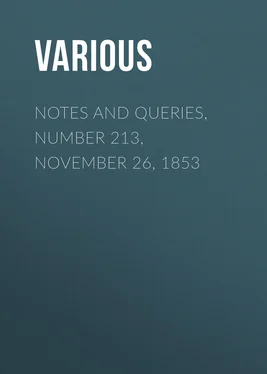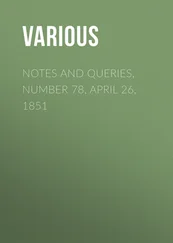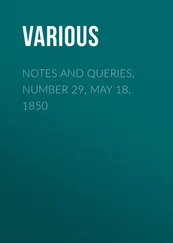Various - Notes and Queries, Number 213, November 26, 1853
Здесь есть возможность читать онлайн «Various - Notes and Queries, Number 213, November 26, 1853» — ознакомительный отрывок электронной книги совершенно бесплатно, а после прочтения отрывка купить полную версию. В некоторых случаях можно слушать аудио, скачать через торрент в формате fb2 и присутствует краткое содержание. Жанр: foreign_antique, periodic, foreign_edu, на английском языке. Описание произведения, (предисловие) а так же отзывы посетителей доступны на портале библиотеки ЛибКат.
- Название:Notes and Queries, Number 213, November 26, 1853
- Автор:
- Жанр:
- Год:неизвестен
- ISBN:нет данных
- Рейтинг книги:4 / 5. Голосов: 1
-
Избранное:Добавить в избранное
- Отзывы:
-
Ваша оценка:
- 80
- 1
- 2
- 3
- 4
- 5
Notes and Queries, Number 213, November 26, 1853: краткое содержание, описание и аннотация
Предлагаем к чтению аннотацию, описание, краткое содержание или предисловие (зависит от того, что написал сам автор книги «Notes and Queries, Number 213, November 26, 1853»). Если вы не нашли необходимую информацию о книге — напишите в комментариях, мы постараемся отыскать её.
Notes and Queries, Number 213, November 26, 1853 — читать онлайн ознакомительный отрывок
Ниже представлен текст книги, разбитый по страницам. Система сохранения места последней прочитанной страницы, позволяет с удобством читать онлайн бесплатно книгу «Notes and Queries, Number 213, November 26, 1853», без необходимости каждый раз заново искать на чём Вы остановились. Поставьте закладку, и сможете в любой момент перейти на страницу, на которой закончили чтение.
Интервал:
Закладка:
Cambridge.
RAPPING NO NOVELTY
It may be interesting to the believers in modern miracles to learn that at all events "rapping" is no new thing. I now send you the account of an incident in the sixteenth century, which bears a strong resemblance to some of those veracious narrations which have enlightened mankind in the nineteenth century.
Rushton Hall, near Kettering in Northamptonshire, was long the residence of the ancient and distinguished family of Treshams. In the reign of Queen Elizabeth, the mansion was occupied by Sir Thomas Tresham, who was a pedant and a fanatic; but who was an important character in his time by reason of his great wealth and powerful connexions. There is a lodge at Rushton, situate about half a mile from the old hall, now in ruins; but covered all over, within and without, with emblems of the Trinity. This lodge is known to have been built by Sir Thomas Tresham; but his precise motive for selecting this mode of illustrating his favourite doctrine was unknown until it appeared from a letter written by himself about the year 1584, and discovered in a bundle of books and papers inclosed, since 1605, in a wall in the old mansion, and brought to light about twenty years ago. The following relation of a "rapping" or "knocking" is extracted from this letter:
"If it be demanded why I labour so much in the Trinity and Passion of Christ to depaint in this chamber, this is the principal instance thereof; That at my last being hither committed 1 1 This refers to his commitments for recusancy, which had been frequent.
, and I usually having my servants here allowed me, to read nightly an hour to me after supper, it fortuned that Fulcis, my then servant, reading in the Christian Resolution , in the treatise of Proof that there is a God, &c. , there was upon a wainscot table at that instant three loud knocks (as if it had been with an iron hammer) given; to the great amazing of me and my two servants, Fulcis and Nilkton."
Minor Notes
Bond a Poet, 1642, O.S. —In the Perfect Diurnall , March 29, 1642, we have the following curious notice:
"Upon the meeting of the House of Lords, there was complaint made against one Bond, a poet, for making a scandalous letter in the queen's name, sent from the Hague to the king at York. The said Bond attended upon order, and was examined, and found a delinquent; upon which they voted him to stand in the pillory several market days in the new Palace (Yard), Westminster, and other places, and committed him to the Gatehouse, besides a long imprisonment during the pleasure of the house: and they farther ordered that as many of the said letter as could be found should be burnt."
His recantation, which he afterwards made, is in the British Museum.
E. G. Ballard.The late Harvest. —In connexion with the present late and disastrous harvest, permit me to contribute a distich current, as an old farmer observed to-day, "when I was a boy:"
"When we carry wheat o' the fourteenth of October,
Then every man goeth home sober."
Meaning that the prospect of the "yield" was not good enough to permit the labourers to get drunk upon it.
R. C. Warde.Kidderminster.
Misquotation. —In an article entitled "Popular Ballads of the English Peasantry," a correspondent of "N. & Q." (Vol. v., p. 603.) quotes as "that spirit-stirring stanza of immortal John ," the lines:
"Jesus, the name high over all," &c.
These lines were not written by John , but by Charles Wesley . Here is the proof:
1st. A hymn of which the stanza quoted is the first, appears (p. 40.) in the Collection of Hymns published by John Wesley in 1779; but in the preface he says, "but a small part of these hymns are of my own composing."
2nd. In his Plain Account of Christian Perfection , he says:
"In the year 1749, my brother printed two volumes of Hymns and Sacred Poems . As I did not see them before they were published, there were some things in them which I did not approve of; but I quite approved of the main of the hymns on this head."— Works , vol. xi. p. 376., 12mo. ed. 1841.
3rd. The lines quoted by your correspondent form the ninth stanza of a hymn of twenty-two stanzas (which includes the six in John Wesley's Collection ), written "after preaching (in a church)," and published in " Hymns and Sacred Poems . In two volumes. By Charles Wesley, M.A., Student of Christ Church, Oxford. Bristol: printed and sold by Felix Farley, 1749." A copy is in my possession. The hymn is No. 194.; and the stanza referred to will be found in vol. i. p. 306.
J. W. Thomas.Dewsbury.
Epitaph in Ireland. —The following lines were transcribed by me, and form part of an epitaph upon a tombstone or mural slab, which many years past was to be found in (if I mistake not) the churchyard of Old Kilcullen, co. Kildare:
"Ye wiley youths, as you pass by,
Look on my grave with weeping eye:
Waste not your strenth before it blossom,
For if you do yous will shurdley want it."
Dublin.
Reynolds (Sir Joshua's) Baptism. —I have been favoured by the incumbent of Plympton S. Maurice with a copy of the following entry in the Register of Baptisms of that parish, together with the appended note; which, if the fact be not generally known, may be of interest to your correspondent A. Z. (Vol. viii., p. 102.) as well as to others among the readers of "N. & Q.":
"1723. Joseph, son of Samuel Reynolds, clerk, baptised July the 30th."
On another page is the following memorandum:
"In the entry of baptisms for the year 1723, the person by mistake named Joseph , son of Samuel Reynolds, clerk, baptized July 30th, was Joshua Reynolds, the celebrated painter, who died February 23, 1792."
Samuel Reynolds, the father, was master of Plympton Grammar School from about 1715 to 1745, in which year he died. During that period his name appears once in the parish book, in the year 1742, as "minister for the time being" (not incumbent of the parish): the Rev. Geo. Langworthy having been the incumbent from 1736 to 1745, both inclusive.
Query, Was Sir Joshua by mistake baptized Joseph ? or was the mistake made after baptism, in registering the name ?
J. Sansom.Oxford.
Tradescant. —The pages of "N. & Q." have elicited and preserved so much towards the history of John Tradescant and his family, that the accompanying extract from the register of St. Nicholas Cole Abbey, in the city of London, should have a place in one of its Numbers:
"1638. Marriages. —John Tradeskant of Lambeth, co. Surrey, and Hester Pooks of St. Bride's, London, maiden, married, by licence from Mr. Cooke, Oct. 1."
This lady erected the original monument in Lambeth churchyard upon the death of her husband in 1662. She died 1678.
G.Queries
GRAMMAR IN RELATION TO LOGIC
Dr. Latham ( Outlines of Logic , p. 21., 1847, and English Language , p. 510., 2nd edition) defines the conjunction to be a part of speech that connects propositions , not words . His doctrine is so palpably and demonstrably false, that I am somewhat at a loss to understand how a man of his penetration can be so far deceived by a crotchet as to be blind to the host of examples which point to the direct converse of his doctrine. Let the learned Doctor try to resolve the sentence, All men are either two-legged, one-legged, or no-legged , into three constituent propositions. It cannot be done; either and or are here conjunctions which connect words and not propositions. In the example, John and James carry a basket , it is of course quite plain that the logic of the matter is that John carries one portion of the basket, and James carries the rest . But to identify these two propositions with the first mentioned, is to confound grammar with logic. The former deals with the method of expression, the latter with the method of stating (in thought) and syllogising. To take another example, Charles and Thomas stole all the apples . The fact probably was, that Charles' pockets contained some of the apples, and Thomas' pockets contained all the rest. But the business of grammar in the above sentence is to regulate the form of the expression, not to reason upon the matter expressed. A little thought will soon convince any person accustomed to these subjects that conjunctions always connect words, not propositions . The only work in which I leave seen Dr. Latham's fundamental error exposed, is in Boole's Mathematical Analysis of Logic ; the learned author, though he seems unsettled on many matters of logic and metaphysics, has clearly made up his mind on the point now under discussion. He says:
Читать дальшеИнтервал:
Закладка:
Похожие книги на «Notes and Queries, Number 213, November 26, 1853»
Представляем Вашему вниманию похожие книги на «Notes and Queries, Number 213, November 26, 1853» списком для выбора. Мы отобрали схожую по названию и смыслу литературу в надежде предоставить читателям больше вариантов отыскать новые, интересные, ещё непрочитанные произведения.
Обсуждение, отзывы о книге «Notes and Queries, Number 213, November 26, 1853» и просто собственные мнения читателей. Оставьте ваши комментарии, напишите, что Вы думаете о произведении, его смысле или главных героях. Укажите что конкретно понравилось, а что нет, и почему Вы так считаете.












